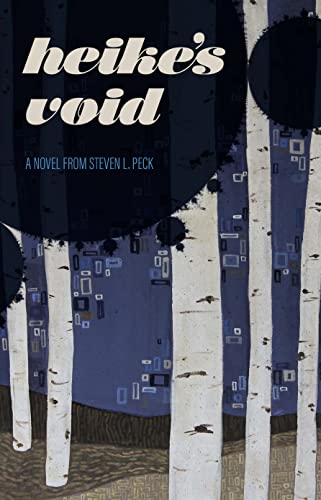
Review
———–
Title: Heikie’s Void
Author: Steven Peck
Publisher: BCC Press
Genre: Fiction
Year Published: 2022
Number of Pages:333
Binding: Trade Paperback
ISBN: 9781948218559
Price: $12.95
Reviewed by Kevin Folkman for the Association for Mormon Letters
In reviewing Steven Peck’s latest novel, Heikie’s Void, I don’t want to give anything away. Part of the excitement in reading Peck’s fiction is that you never know what is going to happen. Heikie’s Void is no different. Intensely Mormon in its basic narrative, you are presented with resurrected beings suffering existential crises, all too human characters making bad choices, and the subsequent emotional roller coaster ride with reckoning, remorse, redemption, and reconciliation.
As Peck has shown in previous works like A Short Stay in Hell or Gilda Trillim: Shepherdess of Rats, Peck’s imagination can take Mormon themes and run with them in unanticipated directions. In Heikie’s Void, Peck takes hints from Mormon theology and seemingly unimportant clues from scripture to build a story of magical realism infused with characters that all of us will immediately recognize as both stereotypes and yet fully realized and relatable.
Peck’s story also takes us in unanticipated directions in the physical world. The story opens in the Fulda Gap in Germany during the height of the cold war, journeys to Ethiopia a decade later, goes rafting the Colorado River a few years after that, and in the present time, reveals secrets in a minivan with kids in tow.
Add to this an examination of the theology of nothingness, the void in the title that stands as a contrast to the rich theology of the afterlife of the Church of Jesus Christ of Latter-day Saints. The church’s post-mortal vision of endless and eternal potential is contrasted with a universe that sprang from nothing and contains both everything and nothing. At its core, the void of the title is an unknowable, unquantifiable presence, a complete and empty non-space that defies definition, location, or boundaries. This nothingness threatens to consume everything, including the characters that circle its undetectable non-existence unawares. If there is nothing, one character muses:
“Does the void exist? Ha! You see the folly of the question. You see the trap set out by trying to wrap some existential quantifiers around it as if a ‘there exists’ can capture a set so empty that the null set Ø is not even found there…The void is such that even this little symbolic title is absent. The absence of absence.”
Despite the unusual themes in Heikie’s Void, it is a solid, if occasionally challenging read. Even the chapter headings are important. Nothing is as expected, and everything is possible in the world of Heikie’s Void. I found it profoundly affecting on multiple fronts and look forward to reading other Peck titles that I have missed. Peck’s work is always a bit of a wild, thrilling ride where questions that begin with “What if…” hold immense promise for the reader.
